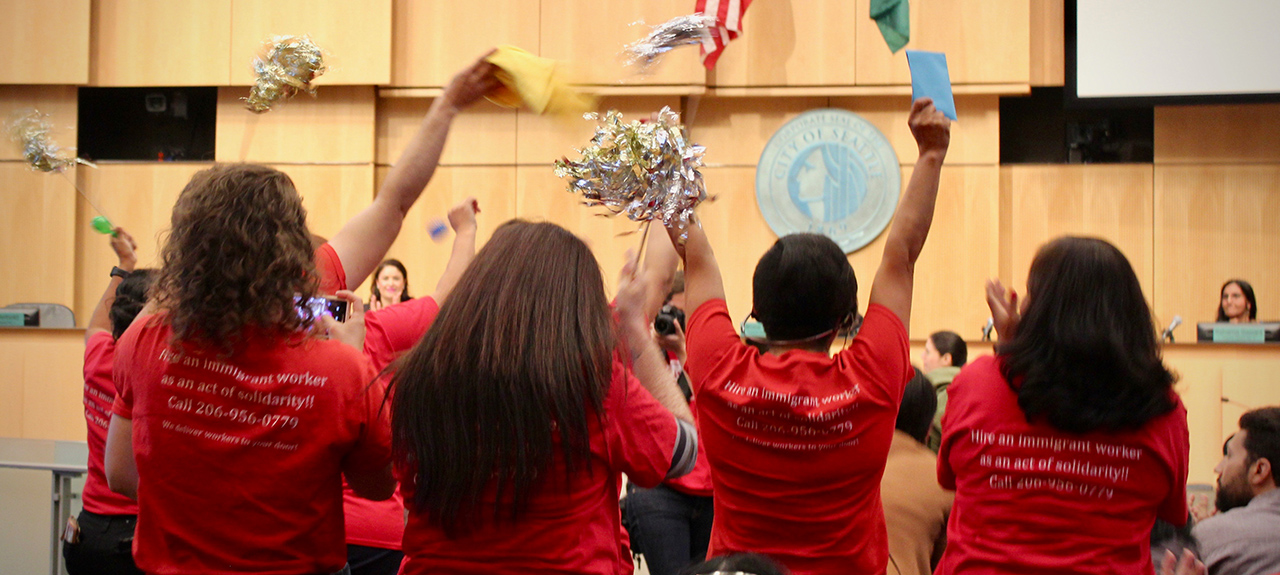Casa Latina leads coalition to pass first-of-a-kind law in the country
Guest post By Amanda Mancenido, Communities of Opportunity
Note: Started in 2014 as a partnership between King County and the Seattle Foundation, Communities of Opportunity (COO) has grown to more than 150 organizations partnering to create greater racial, economic and health equity that enables all people in King County to thrive and prosper. Earlier this year, COO made a grant to support the efforts of a coalition led by Casa Latina to extend basic protections to domestic workers. These grants support efforts to change government policies and practices to increase equity and opportunity across the region.
For decades, labor laws have excluded domestic workers from basic protections such as minimum wage and rest breaks. Due to this history of exclusion, the women, immigrants and people of color who make up the majority of domestic workers are vulnerable to discrimination and harassment. “Right now, we’re invisible,” said Jonny Arenas, a domestic worker of 10 years. “We just want everybody to treat everybody with dignity.”

Tales of wage theft, unfair pay and abuse faced by domestic workers are not new to Casa Latina, an immigrant worker rights organization that empowers Latino immigrants through employment, education and community organizing. For over 20 years, they have worked closely with domestic workers, particularly Latina housecleaners, to improve their access to economic opportunity and health. Rocio Burgos, Casa Latina’s Household Helper Organizer and a housecleaner of six years, knows firsthand the pressure domestic workers can feel in their workplaces. “At first when I got here, I was working with a family who was paying me really low. I did know it was low pay, but I didn’t speak English very well and when you need money, what option do you have?” she said.
For the last year, Casa Latina has been fighting to change these unjust working conditions through groundbreaking systems and policy change. Casa Latina formed a coalition with the National Domestic Workers Alliance, Working Washington and SEIU 775 to craft a law aimed at decreasing inequities in Seattle for domestic workers, including housecleaners, nannies and caregivers.
In drafting the bill, Casa Latina’s priority was centering the experiences of domestic workers at every step of the process. They started by connecting housecleaners to leadership and public speaking training to strengthen their capacity to advocate. Domestic workers then shared their stories and voiced their concerns through surveys and community listening sessions with Seattle City Councilmember Teresa Mosqueda, who sponsored the bill. Casa Latina secured translation services for committee and council meetings to ensure community members were engaged in the legislative process.
By extending access to the minimum wage and meal and rest breaks, this bill provides basic worker protections to domestic workers in Seattle. It prohibits employers from confiscating workers’ personal documents and provides a standard notice of workers’ rights to workers and employers. The bill also establishes a groundbreaking Domestic Workers Standards Board that brings workers and employers together in ongoing dialogue and policy review.
When the Domestic Workers’ Bill of Rights was considered by the city council at the end of July, workers, employers and supporters showed up in full force to support it. Workers shared the struggles of working “in the shadows,” employers voiced the importance of caring for “workers who make all other work possible,” and supporters spoke passionately about the bill’s potential to improve the health and economic well-being of domestic workers.
Thanks to the organizing efforts of Casa Latina and the coalition, the council voted unanimously to pass the ordinance, making Seattle the first city in the nation with such a law.
Burgos smiled as she proudly explained what the bill means to her and fellow housecleaners. “We’re happy because now with this bill we’re in the light; we’re not in the shadows anymore. But there’s more work to do and we’re going to do it.”
Casa Latina plans to continue building community capacity for advocacy through leadership development and education campaigns that focus on the lived experiences of domestic workers.
As Casa Latina moves forward with their systems and policy change work, they want to ensure the Domestic Workers’ Bill of Rights leads to lasting and effective change. Maria Duarte, a housecleaner and Casa Latina member who pushed for the bill from the start, attributes their success to community connectedness.
“As long as we stick together,” Duarte says, “we’ll be strong.”
Note: This guest blog expresses the opinions of its author, who was invited by the Foundation to share a community-based perspective. The views expressed are not necessarily those of Seattle Foundation and the forwarding or reposting of this content should not be viewed as an endorsement.

